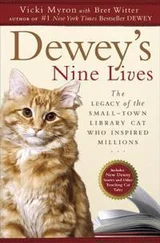“A one-pound baby.”
“I don’t think he even weighs that much.”
The kitten shook his tail and nestled down into Mary’s arms. He didn’t just trust the library staff instinctively, it turned out; he trusted everyone.
“Oh, Vicki,” Mary said. “He’s adorable. What’s his name?”
“We’re calling him Dewey. After Melville Dewey. But we haven’t really decided on a name yet.”
“Hi, Dewey. Do you like the library?” Dewey stared into Mary’s face, then pushed his head against her arm. Mary looked up with a smile. “I could hold him all day.”
But, of course, she didn’t. She put Dewey back into my arms, and I took him around the corner. The entire staff was waiting for us. “That went well,” I said. “One down, ten thousand to go.”
Slowly we started introducing Dewey to a few regulars known to love cats. He was still weak, so we passed him directly into their arms. Marcie Muckey came in that second day. Instantly smitten. Mike Baehr and his wife, Peg, loved him. “This is a great idea,” they said, which was nice to hear since Mike was on the library board. Pat Jones and Judy Johnson thought him adorable. Actually there were four Judy Johnsons in Spencer. Two were regular library users, and both were Dewey fans. How big is a town of 10,000 people? Big enough to have four Judy Johnsons, three furniture stores, two commercial streets with stoplights, but only one mansion. Everyone calls it The Mansion. Typical Iowa—no fuss, no bother, just the facts.
A week later, Dewey’s story ran on the front page of the Spencer Daily Reporter under the headline “Purr-fect Addition Made to Spencer Library.” The article, which took up half the page, told the story of Dewey’s miraculous rescue and was accompanied by a color photograph of a tiny orange kitten staring shyly but confidently into the camera from atop an old-fashioned pull-drawer card catalog.
Publicity is a dangerous thing. For a week, Dewey had been a secret between the library staff and a few select patrons. If you didn’t come into the library, you didn’t know about him. Now everyone in town knew. Most people, even library regulars, didn’t give Dewey a second thought. There were two groups, though, that were thrilled by his arrival: the cat lovers and the children. Just the smiles on the faces of the children, their excitement and laughter, were enough to convince me Dewey should stay.
Then there were the complainers. I was a little disappointed, I must admit, but not surprised. There is nothing on God’s green earth that someone won’t complain about, including both God and green earth.
One woman took particular offense. Her letter, sent to me and every member of the city council, was pure fire and brimstone, full of images of children keeling over from sudden asthma attacks and pregnant mothers spontaneously miscarrying when exposed to kitty litter. According to the letter, I was a murderous madwoman who was not only threatening the health of every innocent child in town, born or unborn, but also destroying the social fabric of the community. An animal! In a library! If we let that stand, what was to stop people from walking a cow down Grand Avenue? In fact, she threatened to show up in the library one morning very soon with her cow in tow. Fortunately nobody took her seriously. I have no doubt she spoke for others in the community, in her overblown way, but general anger wasn’t my concern. None of those people, as far as I could tell, ever visited the library.
Far more important to me, though, were the worried phone calls. “My child has allergies. What am I going to do? He loves the library,” one woman said. I knew that would be the most common concern, so I was prepared. A year earlier, Muffin, the beloved cat-in-residence at the Putnam Valley Library in upstate New York, had been banished after a library board member developed a severe cat allergy. As a consequence, the library lost $80,000 in promised donations, mostly from the estates of local citizens. I had no intention of letting my cat, or my library, go the way of Muffin.
Spencer didn’t have an allergist, so I solicited the advice of two general practice doctors. The Spencer Public Library, they noted, was a large, open space sectioned off by rows of four-foot-high shelves. The staff area, my office, and the supply closets were enclosed by a temporary wall, leaving six feet open to the ceiling. There were two door-size openings in that wall, and since neither had a door, they were always accessible. Even the staff area was an open space, with desks pushed back-to-back or separated by bookshelves.
Not only did this layout allow Dewey easy access to the safety of the staff area at all times, but the doctors assured me it would also prevent the buildup of dander and hair. The library, apparently, was perfectly designed to prevent allergies. If anyone on staff had been allergic it might have been a problem, but a few hours of exposure every couple of days? The doctors agreed there was nothing to worry about.
I spoke personally with each concerned caller and passed on this professional assessment. The parents were skeptical, of course, but most brought their children to the library for a trial run. I held Dewey in my arms for each visit. I not only didn’t know how the parents would react, I didn’t know how Dewey would react because the children were so excited to see him. Their mothers would tell them to be quiet, be gentle. The children would approach slowly, tentatively, and whisper, “Hi, Dewey,” and then explode with squeals as their mothers ushered them away with a quick, “That’s enough.” Dewey didn’t mind the noise; he was the calmest kitten I’d ever seen. He did mind, I think, that these children weren’t allowed to pet him.
But a few days later, one family was back, this time with a camera. And this time the allergic little boy, the object of such concern for the mother, was sitting beside Dewey, petting him, while his mother took pictures.
“Justin can’t have pets,” she told me. “I never knew how much he missed them. He loves Dewey already.”
I loved Dewey already, too. We all loved Dewey. How could you resist his charm? He was beautiful, loving, social—and still limping on his tiny frostbitten feet. What I couldn’t believe was how much Dewey loved us. How comfortable he seemed around strangers. His attitude seemed to be, how can anyone not love a cat? Or more simply, how can anyone resist me? Dewey didn’t think of himself, I soon realized, as just another cat. He always thought of himself, correctly, as one of a kind.
Chapter 3
Dewey Readmore Books

Dewey was a fortunate cat. He not only survived the freezing library drop box, but also fell into the arms of a staff that loved him and a library perfectly designed to care for him. There were no two ways about it, Dewey led a charmed life. But Spencer was also lucky, because Dewey couldn’t have fallen into our lives at a better time. That winter wasn’t just bitterly cold; it was one of the worst times in Spencer’s history.
Those who lived in larger cities may not remember the farm crisis of the 1980s. Maybe you remember Willie Nelson and Farm Aid. Maybe you remember reading about the collapse of family farming, about the nation moving from small growers to large factory farms that stretch for miles without a farmhouse, or even a farmworker, in sight. For most people, it was just a story, not something that affected them directly.
In Spencer, you could feel it: in the air, in the ground, in every spoken word. We had a solid manufacturing base, but we were still a farm town. We supported, and were supported by, farmers. And on the farms, things were falling apart. These were families we knew, families that had lived in the area for generations, and we could see the strain. First they stopped coming in for new parts and machinery, making do with bootstrap repairs. Then they cut back on supplies. Finally they stopped making mortgage payments, hoping for a booming harvest to set the account books right. When a miracle didn’t come, the banks foreclosed. Almost half the farms in northwest Iowa went into foreclosure in the 1980s. Most of the new owners were giant farming conglomerates, out-of-state speculators, or insurance companies.
Читать дальше













